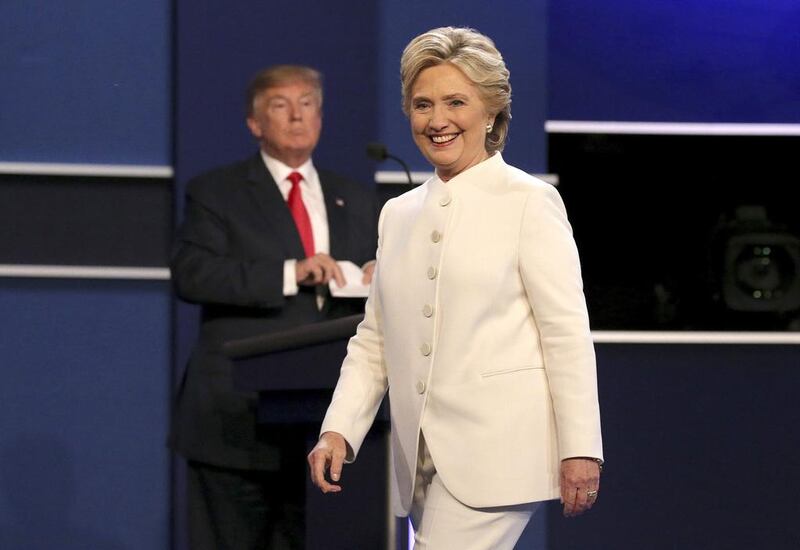With the United States presidential race entering its final days and scandals dogging the two main candidates, Americans are becoming more and more frustrated and dissatisfied with the political campaign.
Arabic-language commentator Samir Al Saadawi said that although the Republican nominee, Donald Trump, has not yet lost the election, the Democrats’ Hillary Clinton has skilfully dropped hints giving the impression that he will inevitably lose.
Writing in the pan-Arab daily paper Al Hayat, Al Saadawi noted that the former secretary of state did not bat an eyelid when WikiLeaks files were released revealing previously secret information about the four decades she has spent in the public eye.
“Rather, Hillary Clinton has succeeded in depicting her opponent as corrupt to the bones, with a focus on his past as a greedy businessman and a womaniser,” the writer said.
But, he continued, in spite of Mr Trump’s image as hostile towards Arabs and Muslims – formed through his fiery statements intended to mobilise far-right conservatives – the Republican nominee has not completely lost the support of Republicans of Middle Eastern origins, many of whom still have faith in him reaching the White House and overthrowing the ruling elite.
“Both candidates have faced off in three debates but failed to present the reasons behind their differences or to provide a detailed explanation of their programmes. All they did was bicker and trade insults,” Al Saadawi said.
He claimed that Mrs Clinton was able to place her opponent in a predicament by forcing words out of him that were understood as his refusal to accept it if she won the election.
“This led Trump’s campaign team to quickly clarify that he will not accept her victory if the elections are not 100 per cent honest.”
The writer concluded that the presidential race reflects a level of moral deterioration observed by viewers worldwide, including the Iranian president, Hassan Rouhani, who said the choice offered to voters in the American presidential elections was between “bad and worse”.
Writing in the pan-Arab daily paper Asharq Al Awsat, Egyptian columnist Emile Ameen said American citizens felt their country's tragic situation on the eve of the third presidential debate.
“The Republican nominee was initially unwilling to accept the election results on November 8, and pointed out the highly probable election rigging in favour of Hillary Clinton,” he noted.
Then the writer wondered whether Mr Trump’s statements “are a self-fulfilling prophecy” – meaning that he sees his defeat coming and is trying to kick up as much dust as possible – or if his words directly or indirectly bear some truth.
"Those who are closely following the news have noticed the fierce campaign launched by newspapers close to the White House, in particular The Washington Post, that explained at length the impossibility of vote rigging," Ameen wrote.
“According to the American daily paper, vote rigging at a federal level would call for a huge collusion that would shatter the much-vaunted American democracy. The voting process consists of many steps and is characterised by its transparency and openness, not to mention the observers from both parties that watch every step of the electoral process.”
But surprisingly, the writer noted, more than half of the Americans are expecting vote rigging in the upcoming election.
According to a Reuters/Ipsos poll released last Friday, only half of Republicans would accept Mrs Clinton as their president. And if she wins, 70 per cent of poll respondents said it would be because of illegal voting or vote rigging.
On the other hand, the poll showed that seven out of 10 Democrats said they would accept Mr Trump’s victory and less than 50 per cent would attribute it to illegal voting or vote rigging.
Ameen concluded that these results pointed to the dilemma of what constitutes a genuine democracy, and he wondered whether the United States was witnessing the twilight of democracy.
translation@thenational.ae





